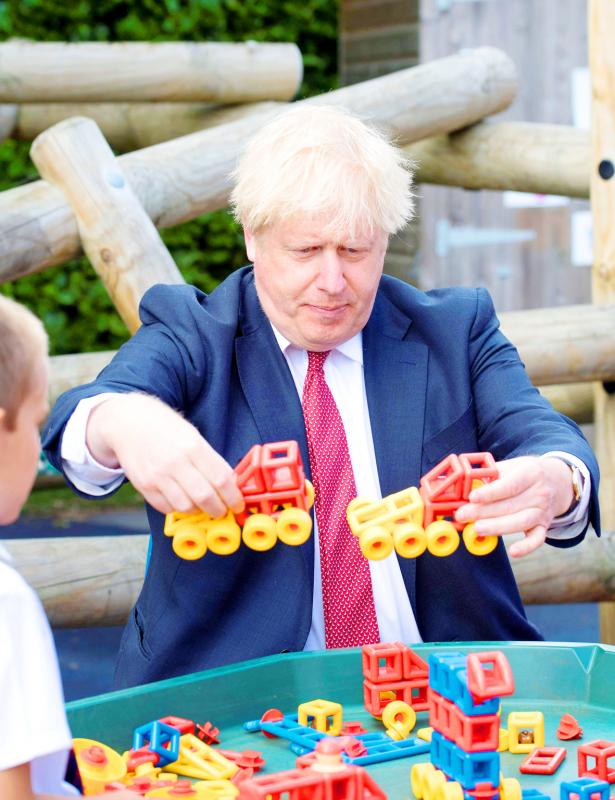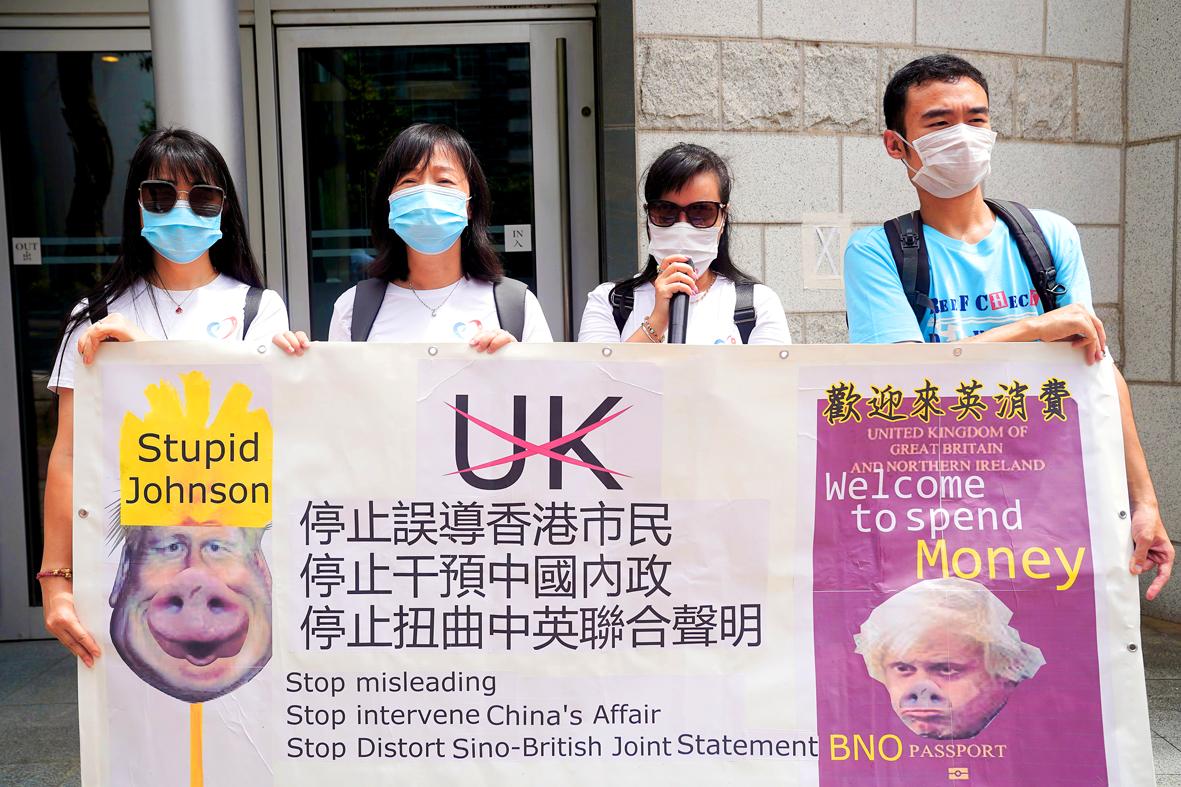British Prime Minister Boris Johnson yesterday all but confirmed that the UK would suspend an extradition treaty with Hong Kong owing to a National Security Law imposed by Beijing, bringing another clash with China following last week’s decision over Huawei Technologies Co (華為).
Speaking on a visit to a school in Kent, England, Johnson said that British Secretary of State for Foreign and Commonwealth Affairs Dominic Raab would explain later yesterday “about how we are going to change our extradition arrangements to reflect our concerns about what’s happening with the security law in Hong Kong.”
Raab was due to address the UK House of Commons yesterday afternoon and was widely expected to suspend extradition to Hong Kong in light of the law, which effectively criminalizes most political dissent and can even target actions outside of Hong Kong or mainland China.

Photo: AFP
The US, Canada and Australia have already taken similar actions over extradition to Hong Kong.
Earlier yesterday, Chinese Ministry of Foreign Affairs spokesman Wang Wenbin (汪文斌) said such a move by the UK, plus other mooted plans, such as actions against individual Chinese officials due to rights abuses, would harm relations between the two countries.
“These HK-related remarks turn a blind eye to the basic facts that the National Security Law is for the sustained success of ‘one China, two systems,’” Wang said, referring to the system by which Hong Kong has been governed since it returned to Chinese rule in 1997.

Photo: Reuters
“We strongly condemn these actions. We urge the UK to take no more steps down the wrong path, so as to avoid further damage to China-UK relations,” he said.
The UK government last week said it would strip the Chinese telecoms firm Huawei of any role in the UK’s 5G network from 2027 owing to security concerns, which also enraged Beijing.
Johnson, during the school visit, said he did not seek confrontation with China, but the UK had grave concerns about Hong Kong and widespread reports of mass repression and rights abuses targeting the Uighur population in China’s Xinjiang region.
These have included accounts of forced sterilization of Uighur women and the incarceration of huge numbers of people in what appear to be concentration camps.
“There is a balance here,” Johnson said. “I’m not going to be pushed into a position of becoming a knee-jerk Sinophobe on every issue, somebody who is automatically anti-China. But we do have serious concerns. We have concerns about the treatment of the Uighur minority obviously, about the human rights abuses.”
“China is a giant factor of geopolitics, it’s going to be a giant factor in our lives and in the lives of our children and grandchildren. You have got to have a calibrated response and we are going to be tough on some things, but also going to continue to engage,” he added.

AGING: As of last month, people aged 65 or older accounted for 20.06 percent of the total population and the number of couples who got married fell by 18,685 from 2024 Taiwan has surpassed South Korea as the country least willing to have children, with an annual crude birthrate of 4.62 per 1,000 people, Ministry of the Interior data showed yesterday. The nation was previously ranked the second-lowest country in terms of total fertility rate, or the average number of children a woman has in her lifetime. However, South Korea’s fertility rate began to recover from 2023, with total fertility rate rising from 0.72 and estimated to reach 0.82 to 0.85 by last year, and the crude birthrate projected at 6.7 per 1,000 people. Japan’s crude birthrate was projected to fall below six,

US President Donald Trump in an interview with the New York Times published on Thursday said that “it’s up to” Chinese President Xi Jinping (習近平) what China does on Taiwan, but that he would be “very unhappy” with a change in the “status quo.” “He [Xi] considers it to be a part of China, and that’s up to him what he’s going to be doing, but I’ve expressed to him that I would be very unhappy if he did that, and I don’t think he’ll do that. I hope he doesn’t do that,” Trump said. Trump made the comments in the context

SELF-DEFENSE: Tokyo has accelerated its spending goal and its defense minister said the nation needs to discuss whether it should develop nuclear-powered submarines China is ramping up objections to what it sees as Japan’s desire to acquire nuclear weapons, despite Tokyo’s longstanding renunciation of such arms, deepening another fissure in the two neighbors’ increasingly tense ties. In what appears to be a concerted effort, China’s foreign and defense ministries issued statements on Thursday condemning alleged remilitarism efforts by Tokyo. The remarks came as two of the country’s top think tanks jointly issued a 29-page report framing actions by “right-wing forces” in Japan as posing a “serious threat” to world peace. While that report did not define “right-wing forces,” the Chinese Ministry of Foreign Affairs was

PREPAREDNESS: Given the difficulty of importing ammunition during wartime, the Ministry of National Defense said it would prioritize ‘coproduction’ partnerships A newly formed unit of the Marine Corps tasked with land-based security operations has recently replaced its aging, domestically produced rifles with more advanced, US-made M4A1 rifles, a source said yesterday. The unnamed source familiar with the matter said the First Security Battalion of the Marine Corps’ Air Defense and Base Guard Group has replaced its older T65K2 rifles, which have been in service since the late 1980s, with the newly received M4A1s. The source did not say exactly when the upgrade took place or how many M4A1s were issued to the battalion. The confirmation came after Chinese-language media reported